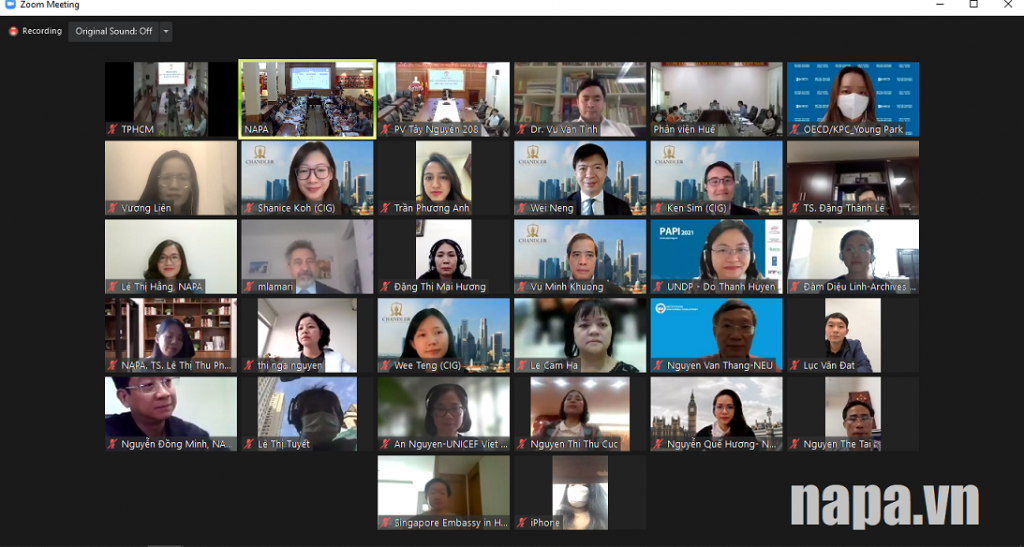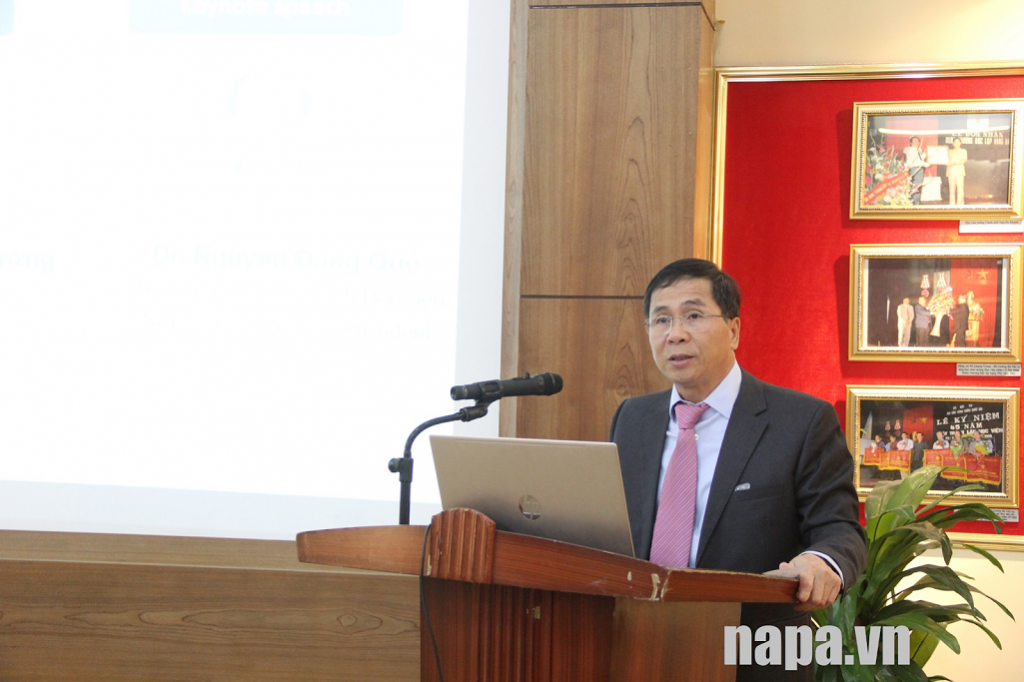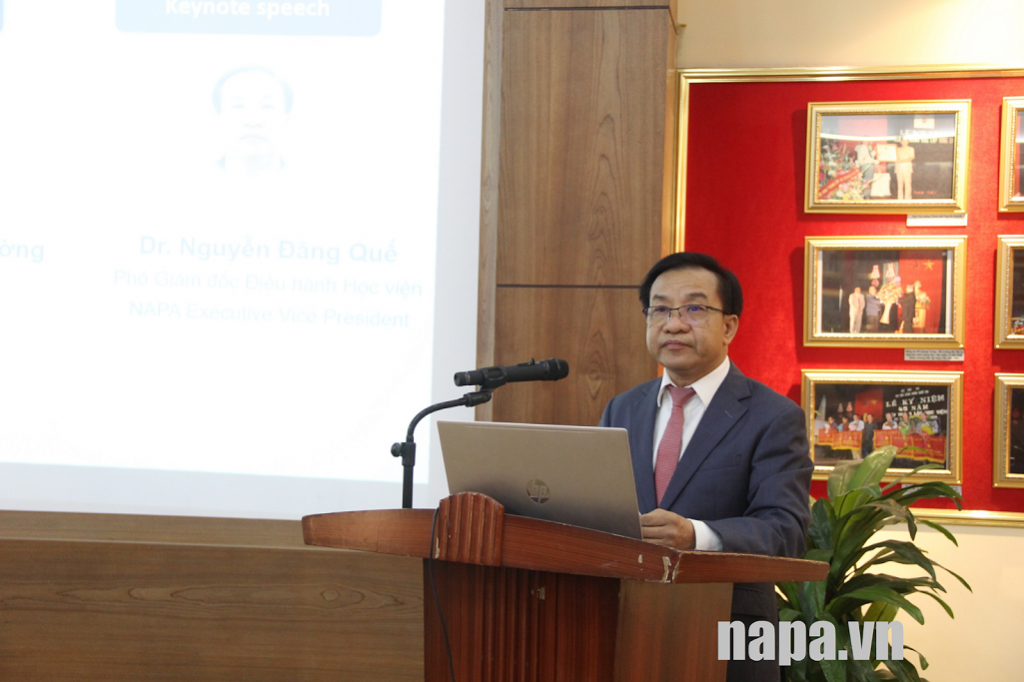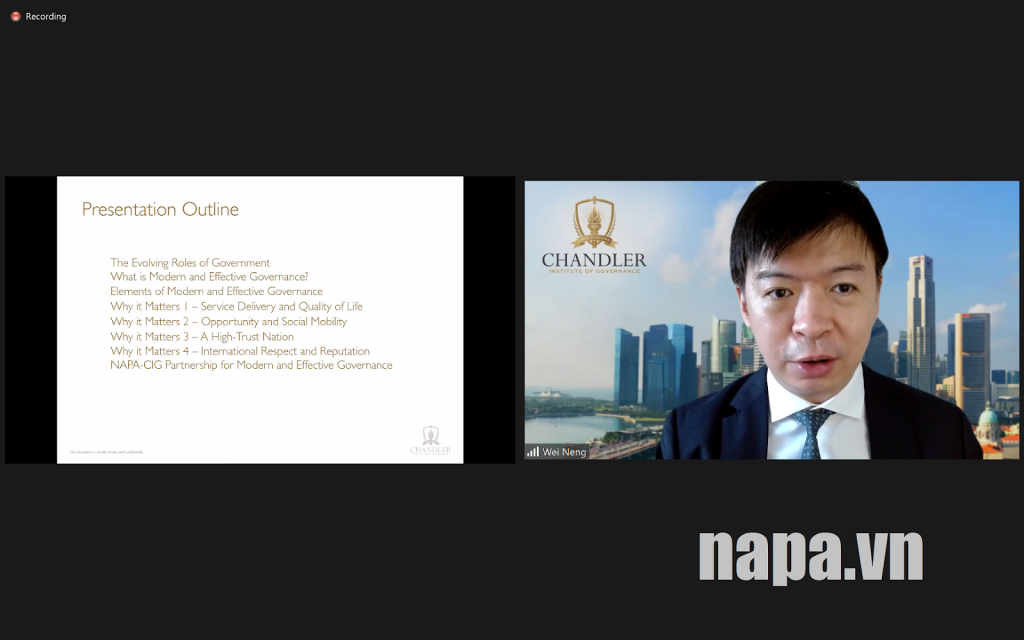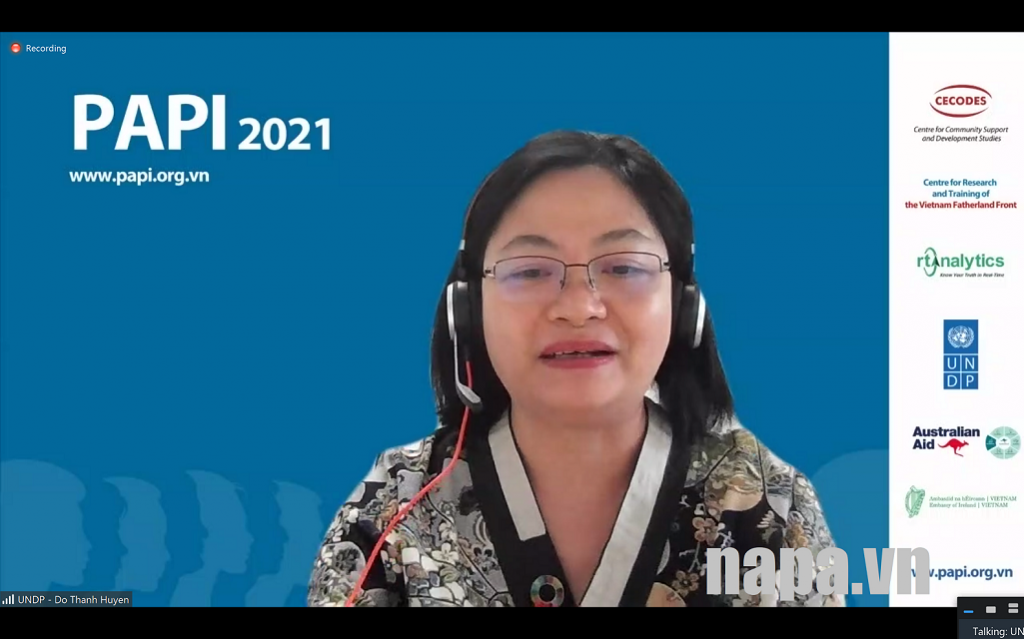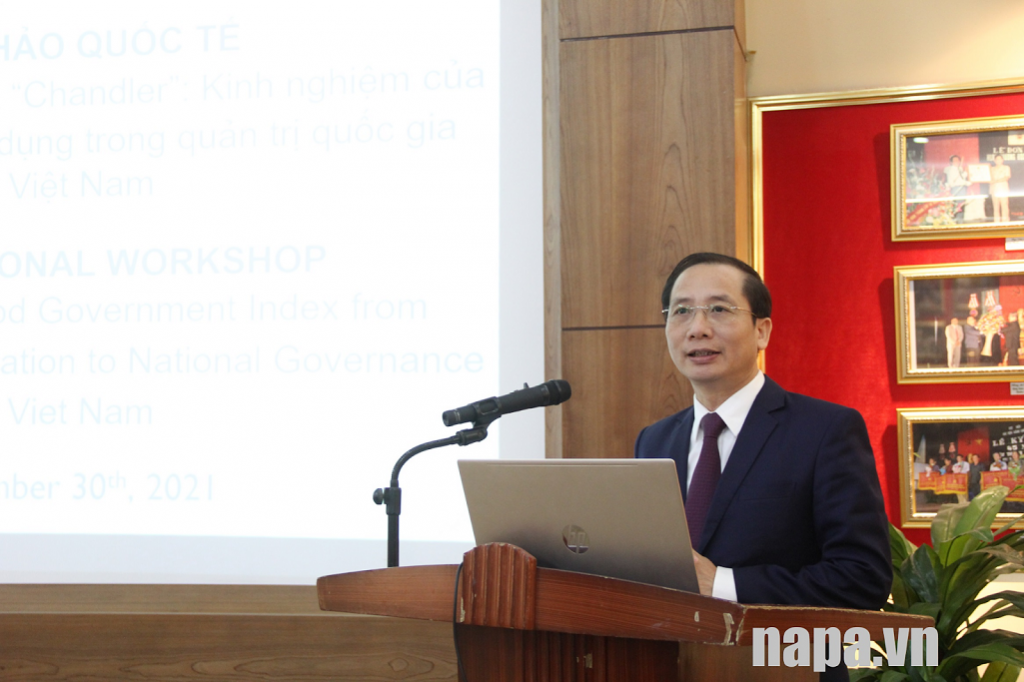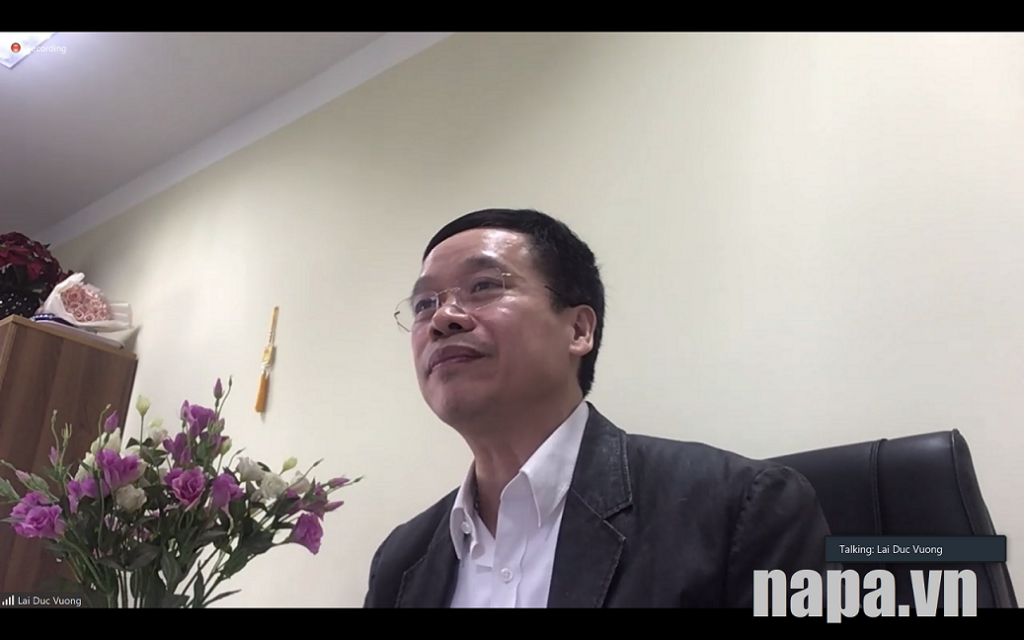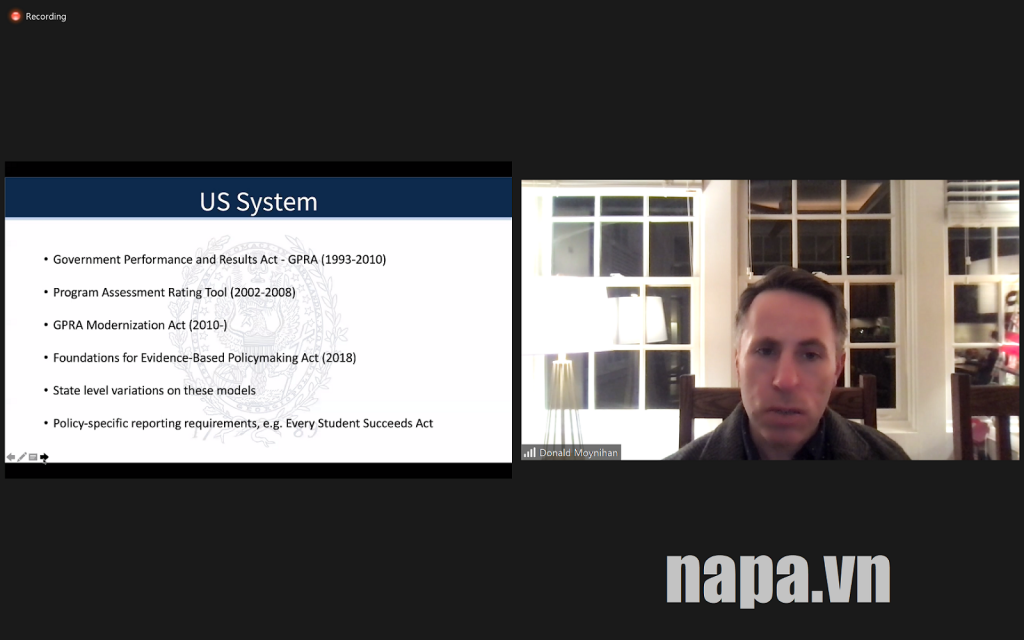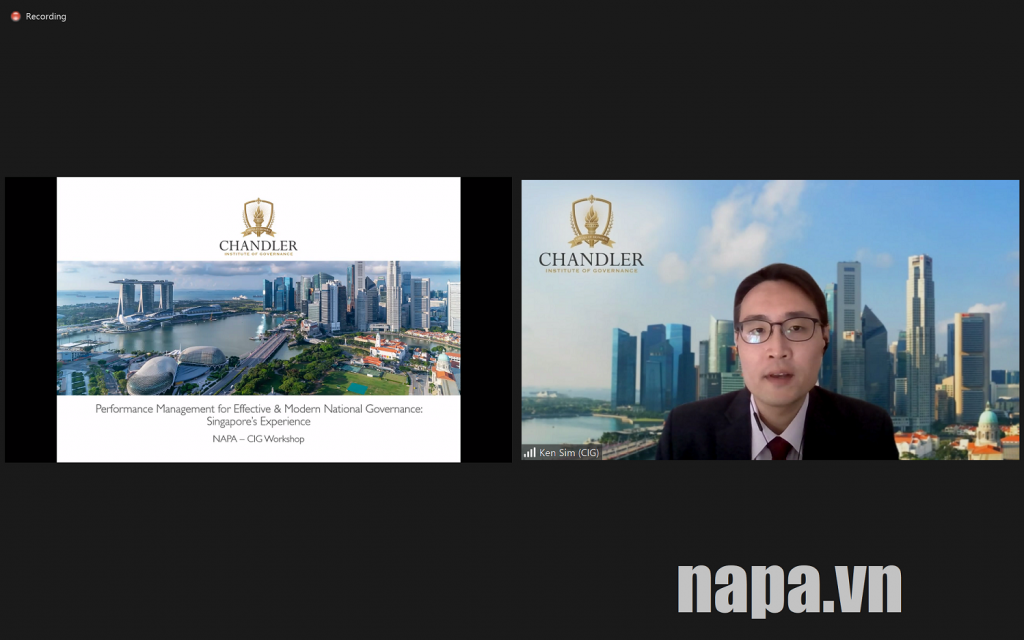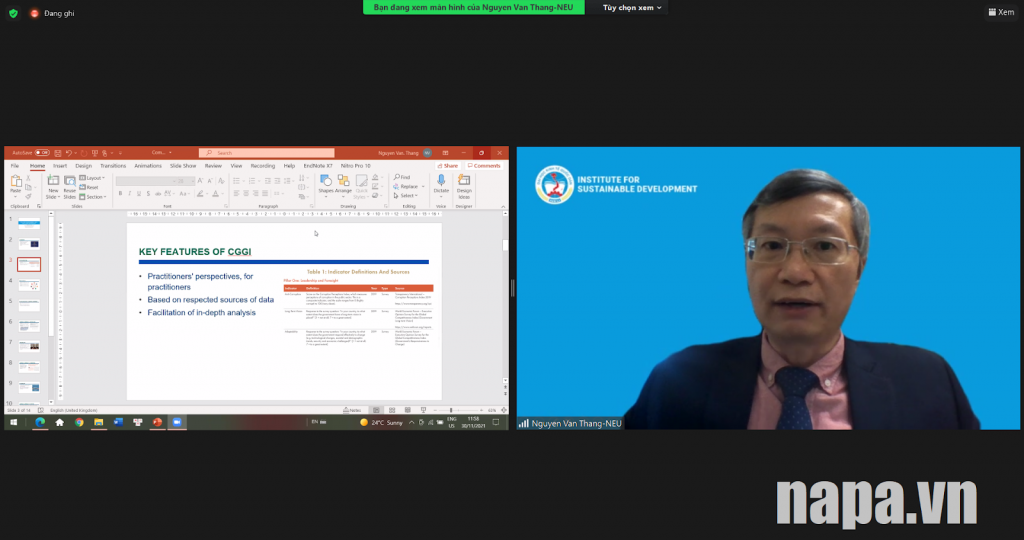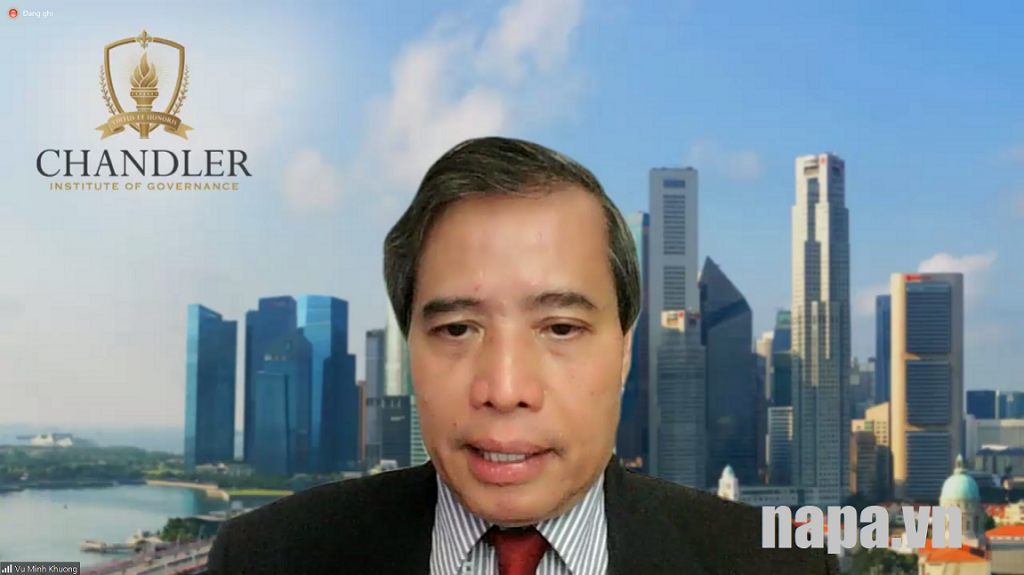(napa.vn) – On November 30, 2021, the National Academy of Public Administration organized the International Workshop: The Chandler Good Government Index from Singapore and application to national governance in Viet Nam in collaboration with the Chandler Institute of Governance, Singapore.
The workshop was held in a hybrid format which is face-to-face and online.
Co-chairing and moderating of the workshop, on the side of the Ministry of Home Affairs (MOHA), were Assoc. Prof. Dr. Trieu Van Cuong, MOHA Vice Minister, Dr. Nguyen Dang Que, NAPA Executive Vice President; on the side of Singapore were Mr. Wu Wei Neng, CEO, Chandler Institute of Governance (CIG), and Prof. Dr. Vu Minh Khuong from the National University of Singapore.
Attending the workshop were international experts from Georgetown University, USA; National School of Administration (ENAP), Quebec, Canada; Institute of Governance – Chandler; British University Vietnam; University of Chicago, USA; representatives of Embassies of Singapore and Laos in Ha Noi; representatives of international organizations in Vietnam; representatives of MOHA departments; scholars from Hanoi National University, Hanoi University of Home Affairs, and other training institutions.
Attending the workshop, from NAPA, were Dr. Dang Xuan Hoan, Senior Lecturer, former NAPA President; leaders of NAPA departments and faculties; and officials, lecturers, students.
Making the welcome speech in the workshop, Mr. Wu Wei Neng, CEO, the Chandler Institute of Governance, (CIG) highly acknowledged the significance of the workshop which created a chance for NAPA and CIG to share knowledge and experience. It is also an opportunity for universities, research institutes, and organizations around the world to share and learn valuable experiences, best practices of good governance. Mr. Wu Wei Neng said that the Chandler Good Government Index shared at the workshop is based on seven pillars which are leadership and foresight, robust laws and policies; strong institutions; financial stewardship; attractive marketplace; global influence & reputation; helping people rise. It measures the performance of governments around the world and Viet Nam is ranked higher compared to other countries with the same level of development and income.
Speaking at the opening of the Workshop, Assoc. Prof. Dr. Trieu Van Cuong, MOHA Vice Minister affirmed that building a modern, effective and efficient national governance is an indispensable, objective requirement for each country in the development process. National governance presents a new vision in the current period when governance refers not only government business but also active participation of different actors in society in solving shared issues at both national and sub-national levels. However, the concept of “national governance” is new in Viet Nam and there has been so far no commonly agreed connotation. Each country pursues different philosophies and models in building national governance depending on the level of development as well as the specific characteristics of the polity and society. For modernity and effeffectiveness in national governance, it is necessary to have a unified and comprehensive understanding of the concept of “national governance”, associated with the actual context in Viet Nam. Models of national governance will be built in accordance with the trend of the international movement and the specific political and social characteristics of Viet Nam.
Facing with the urgent requirements for building a modern and effective national governance, the International Workshop “The Chandler Good Government Index from Singapore and application to national governance in Viet Nam” organized by the National Academy of Public Administration in collaboration with the Chandler Institute of Governance, Singapore, has a very important scientific and practical significance.
Assoc. Prof. Dr. Trieu Van Cuong, MOHA Vice Minister highly appreciated the concerted efforts and cooperation of the Chandler Institute of Governance, Singapore, and the National Academy of Public Administration in organizing the workshop which provided valuable inputs for development of a training program on national governance for civil servants, public leaders and managers. The workshop also provided inputs for MOHA and NAPA to develop a program for strengthening national governance capacity for public leaders and managers, especially potential leaders at strategic level, which contributes gradually to building a modern, effective national governance in Viet Nam in the spirit of the Resolution of the 13th National Congress of the Communist Party of Viet Nam.
Addressing the workshop, Dr. Nguyen Dang Que, NAPA Executive Vice President affirmed that NAPA is the national training center for cadres, civil servants, and public employees and plays an important role in advising the Government and MOHA on building a modern, effective national governance. In its framework of international cooperation programs, NAPA focuses on research, receiving and transferring knowledge and skills, measurement of national governance, recommendations of measures to improve the national governance capacity of the Government, develop training programs for cadres and civil servants to meet the requirements of a modern and effective national governance.
The workshop focused on the following topics:
(1) The concept and meanings of national governance for modernity and effectiveness and the role of leading and managerial civil servants in building a modern and effective national governance.
(2) The practice of national governance in Viet Nam, the context and direction of building a modern and effective national governance in accordance with international trends and in accordance with Vietnamese reality.
(3) International experience in measuring performance of the Government and implications for Viet Nam; appropriateness and applicability of international experience, and methods of measurement of government performance; solutions of improving governance in Viet Nam.
(4) Determining the requirements and necessary competencies of leading and managerial civil servants for building a modern, effective national governance.
(5) Developing a plan for cooperation between NAPA and CIG in building a program to improve national governance capacity for leading and managerial civil servants, especially potential leaders at strategic level.
The workshop is the opening for a series of cooperation events in research and in renovation of the training programs to improve the capacity of leading and managerial civil servants to meet the requirements of modern, effective national governance.
The workshop has three sessions.
Session 1: Modern, effective national governance: an overview
In Session 1, there were two presentations followed by comments.
In Session 1, there were two presentations followed by comments.
Mr. Wu Wei Neng, CEO of CIG, Singapore presented “Importance, significance of modern, effective national governance”. Mr. Wu Wei Neng raised the following issues: the evolving roles of government; what is modern and effective governance; elements of modern and effective governance; NAPA-CIG co-operation for modern and effective governance.
Ms. Do Thanh Huyen, Policy Analyst of the United Nations Development Program (UNDP) in Viet Nam presented “Provincial Public Administration and Governance Performance Index (PAPI): a tool to promote national governance in Viet Nam”, the Public Administration at provincial level and Public Administration Performance Index (PAPI). PAPI has been introduced in Vietnam since 2009 and has helped enhance operational efficiency of Vietnamese administration. PAPI has helped local governments to operate more actively, to improve quality of the services provided for citizens, businesses, and organizations, and thereby to promote local socio-economic development.
In their comments, Assoc.Prof.Dr. Nguyen Ba Chien, Rector of the Hanoi University of Home Affairs, and Dr. Lai Duc Vuong, General Director, Department of Training, Ministry of Home Affairs.
Session 2: International experience in measuring effectiveness of national governance and implication for national governance in Viet Nam.
Session 2 consisted of three presentations and two comments.
Presenting at the workshop, Mr. Donald Moynihan from Georgetown University, USA shared ” The US Experience of Measuring Effectiveness in National Government”. Mr. Donald Moynihan presented the following topics: Government Performance and Results Act – GPRA (1993-2010); Program Assessment Rating Tool (2002-2008); GPRA Modernization Act (2010-); Foundations for Evidence-Based Policymaking Act (2018); State level variations on these models; Policy-specific reporting requirements. Since 1993, the United States has applied the laws to measure the effectiveness of the Government. The most recent one is the GPRA Modernization Law (2010). The lessons learnt from the experiences of governance of the United States are: (1) Reforms as routines: considering reform as a habit leading to organizational changes, creating a learning forum, discussing performance with supervisors, colleagues. (2) Leadership commitment: create leadership positions with oversight for performance; Select leaders based on ability to manage performance (3) Realistic goals: Create a dialogue about performance; Encourage learning and innovation within agencies; Discuss performance during budget decisions, but don’t expect automatic link between data and decisions; Link to evaluation processes: e.g., via learning agendas encouraging learning and innovation within agencies, discussing the effectiveness of policy implementation in the budget decision process, etc.
Sharing the presentation “Performance Management for Effective & Modern National Governance: Singapore’s Experience” Mr. Kenneth Sim, Director of Academy, CIG emphasized the following contents by raising questions: What does Performance Management Entail? Performance Management and Public Accountability; Whole-of-Government Performance Management; Individual Performance Management.
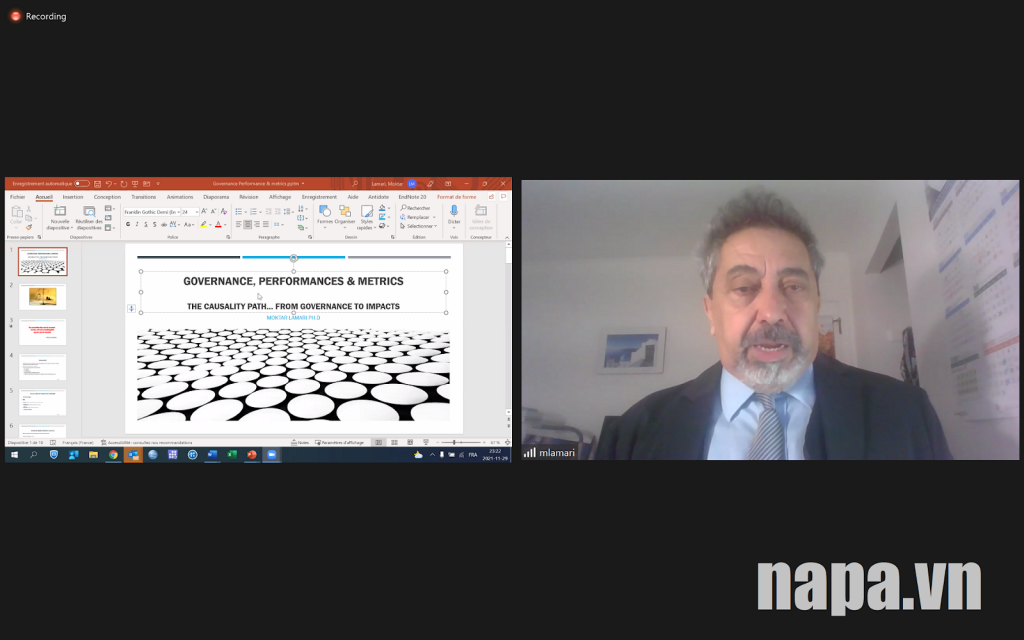
Prof. Dr. Moktar Lamari, Director of the Center for Evaluation Studies, National School of Public Administration, Quebec, Canada spoke at the workshop.
Speaking at the workshop, Prof. Moktar Lamari, National School of Public Administration, Quebec, Canada, emphasized that it is necessary to use measurable indicators to measure effectiveness of government. The Government of Canada has developed a set of indicators including economic indicators to measure efficiency, effectiveness, sustainability, and other achievable goals. In addition, it is necessary to connect between leaders, managers, and researchers to evaluate the optimal performance of state governance.
At the Session 2, Mr. Wu Wei Neng gave a speech at the workshop with the topic “Measuring the Capacity and Effectiveness of National Governance through the
Chandler Good Government Index”. In this section, Mr. Wu Wei Neng shared the concept of good government, presented the Index Framework of Indicators with seven pillars which includes leadership and foresight, robust laws and policies; strong institutions; financial stewardship; attractive marketplace; global influence & reputation; helping people rise.
Prof. Dr. Nguyen Van Thang, Director of the Institute for Sustainable Development, the National Economics University, highly appreciated the significance of the Chandler Good Government Index. During the past 15 years, Vietnam has had many indicators to evaluate the performance of the Government and has pointed out that one of the reasons for the ineffectiveness of the government is the office term-based thinking of some Vietnamese government officials. And it is necessary to study, evaluate, and then take measures to change their mindset .
In his comment, Prof. Dr. Vu Minh Khuong, National University of Singapore has “analyzed and compared international and Vietnamese experiences in evaluating the performance of the Government and implications for national governance in Vietnam”. Male”. Prof. Dr. Vu Minh Khuong affirmed that Vietnam has achieved great developments. In order to reach the desired development level, it is necessary to implement a number of solutions: develop a measure of governance, uphold accountability for management activities, formulate appropriate strategies for development.
Session 3: Cooperation between NAPA and CIG in competency development for public leaders and managers to meet the requirements of modern, effective national governance.
Assoc. Prof. Dr. Luong Thanh Cuong, NAPA Vice President and Mr. Wu Wei Neng, CEO of CIG co-chaired the workshop.
At the Session 3 of the workshop, Mr. Kenneth Sim, Academy Director, CIG discuss the issue of “Public Leaders’ Competency Development Programme for Modern and Effective National Governance”.

Assoc. Prof. Dr. Nguyen Thi Hong Hai, Dean, Faculty of Administrative Sciences and Organization – Personnel Management, NAPA speaking at the workshop.
In Session 3, Assoc.Prof.Dr. Nguyen Thi Thu Van and Dr. Nguyen Tien Hiep shared opinions and asked questions on clarification of the issues related to national governance and applicability of international experiences of modern and effective national governance to Viet Nam.

Assoc. Prof. Dr. Nguyen Thi Thu Van, Dean, Faculty of Documents and Administrative Technology, NAPA speaking at the workshop.

Dr. Nguyen Tien Hiep, Director, Center for Foreign Languages Informatics and Library, NAPA speaking at the workshop.
At Session 3, the leaders of NAPA and CIG discussed and proposed a plan for cooperation in building a training program to improve the capacity of public leaders and managers to meet requirements of modern and effective national governance.

Ms. Pham Thi Quynh Hoa, Director, Department of International and Cooperation, NAPA talked about the plan for cooperation between CIG and NAPA in development of a training program to improve the capacity of public leaders and managers to meet the requirements of modern and effective national governance.
In the closing speech of the workshop Mr. Wu Wei Neng and Assoc.Prof.Dr. Luong Thanh Cuong, NAPA Vice President thanked the international experts, scholars, practitioners, and managers for providing important knowledge such as indicators to assess the effectiveness of the Government, countries’ experiences. In the coming time, the National Academy of Public Administration and the Chandler Institute of Governance will develop a plan for cooperation in training Vietnamese public leaders and managers to meet the requirements of modern and effective state governance.
Opening remarks of Mr. Wu Wei Neng Executive Director, CIG
Opening speech of Assoc. Prof. Dr. Trieu Van Cuong Vice Minister of Home Affairs
Keynote speech of Dr. Nguyen Dang Que NAPA Executive Vice President


